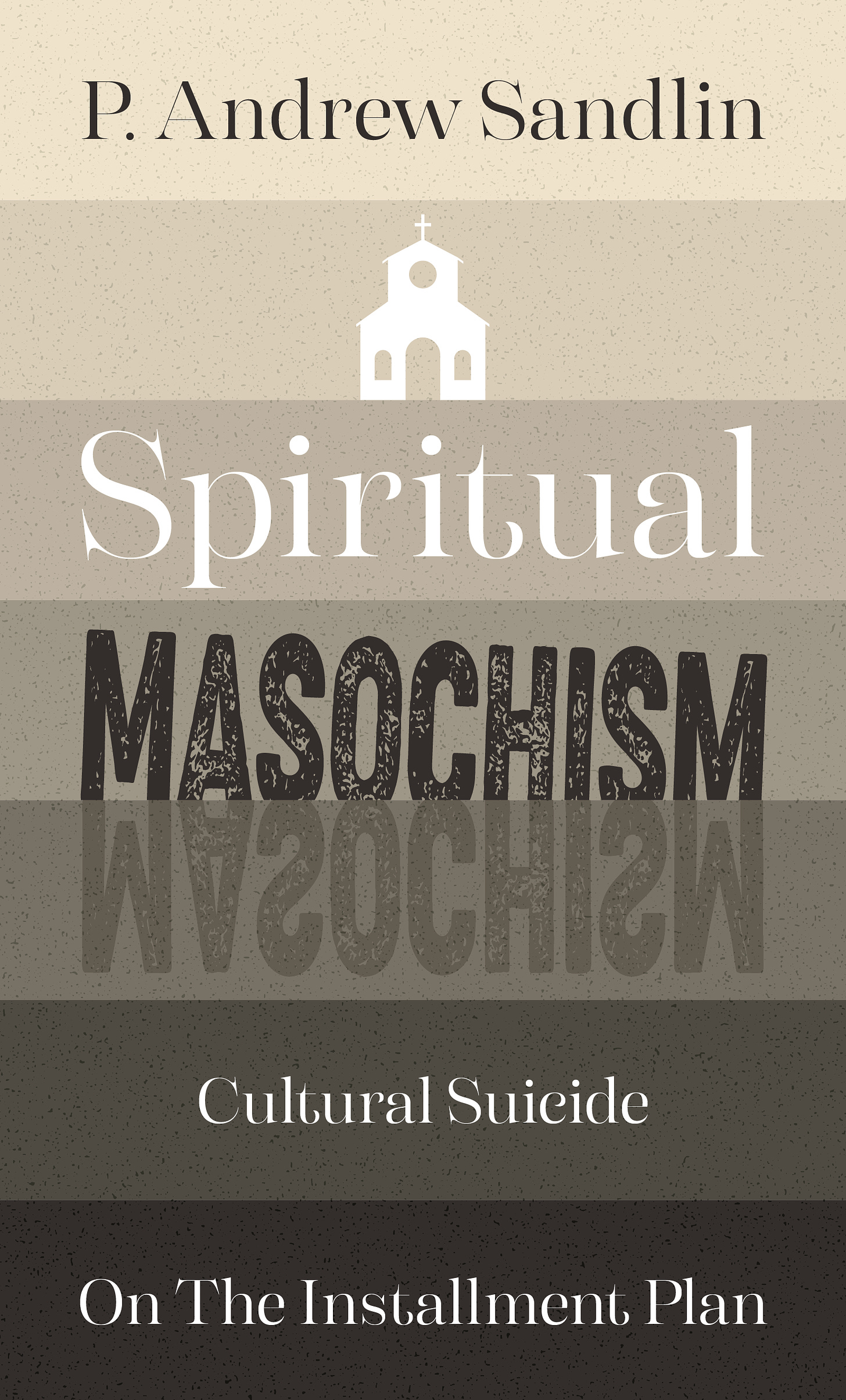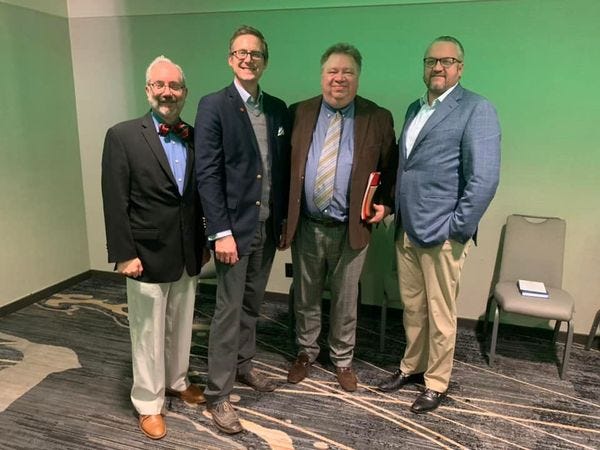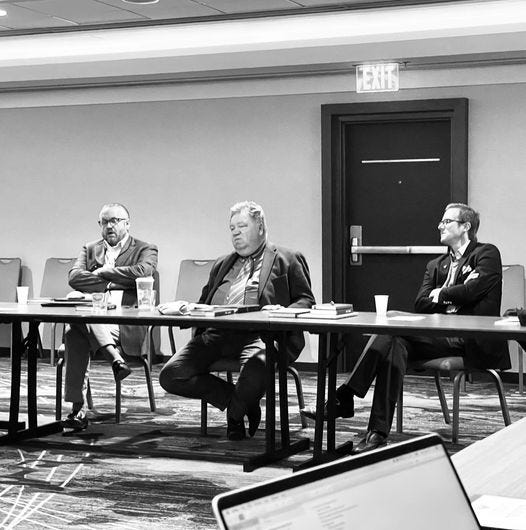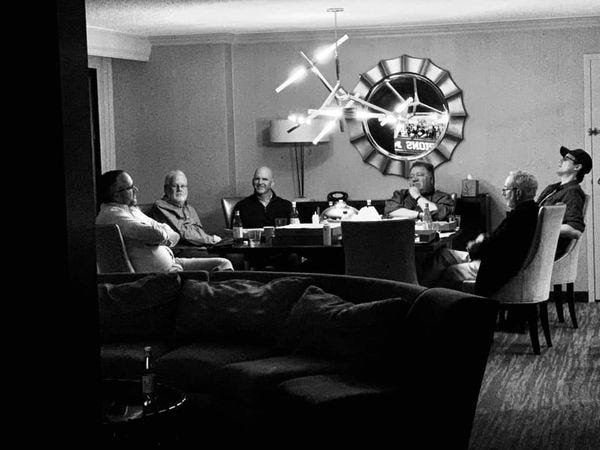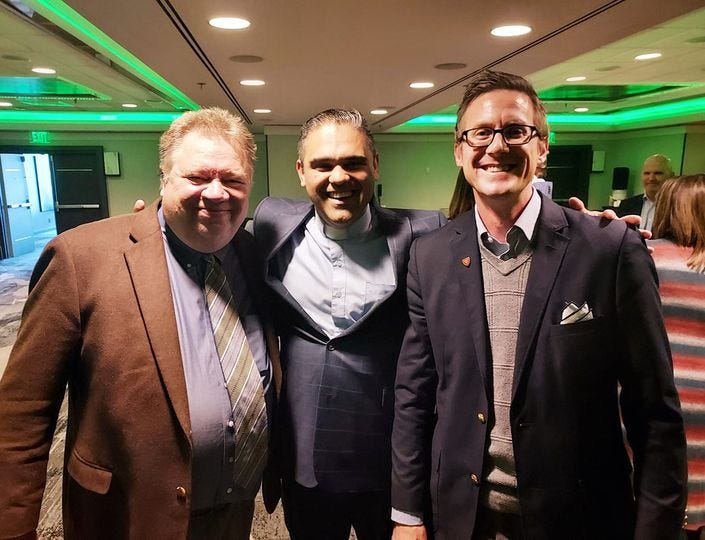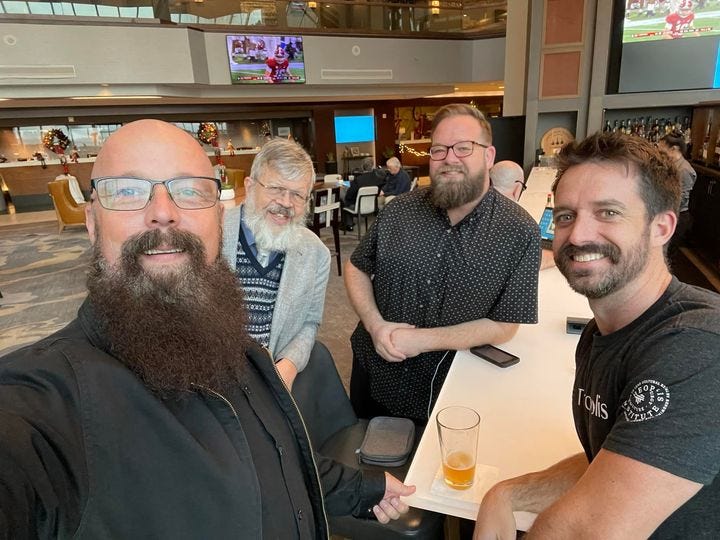Creational Economics
Genesis 1 necessitates economic liberty, and to oppose free markets is to assault God's created order.
Dear friends and supporters,
Last weekend was CCL’s annual symposium in San Francisco. Here is an edited version of my remarks:
If we’re going to address economics, we need to begin at the beginning, and that means Genesis 1. The Bible is filled with teaching on economics. I’ll never forget what my father told me when I was just a boy: Jesus talked more about hell than about heaven, and he talked more about money than he did about hell. Money must be pretty important, because the Bible has a great deal to say about it.
Unfortunately, most Christians leap directly to the OT prophets reprimanding the oppressors of the poor, or to Jesus’ warnings to the rich young ruler, or James‘ cautions to the rich. These are all vital biblical truths, and we must look them unflinchingly in the eye, but they’re precisely the wrong place to start when considering the economic dimension of the Christian worldview.
We need to start with creation. In fact, we need to start at creation with everything — except God. Many Christians would find this assertion palpably mistaken. Creation has nothing to do with economics, they might suppose. But in fact, it has everything to do with economics, and I suggest that we can’t understand subsequent biblical teachings about economics if we don’t understand something of creational economics. To repeat: we must begin at the beginning.
Although Genesis 1 doesn’t address economics explicitly, it certainly addresses it implicitly. I’ll enumerate three of those foundational economic truths that the creation account implies.
Creation Very Good
First, God’s materially abundant creation is very good. That’s the verdict God delivered at the conclusion of the sixth day of creation (Gen. 1:31). Everything that God created was either material or produced by materiality (like wind and waves). This entire creational project he designated as “very good.”
It’s imperative to make this point because not just the wider culture but also the church has for 2000 years been plagued by the oldest and most persistent and pernicious heresy: Gnosticism. In the biblical worldview, the problem in the world is sin. For gnostics, the problem is creation, notably the material world. Gnosticism is a form of ancient radical dualism, which is almost always the subordination of matter to spirit, where “spirit” is defined as non-material. Let me deliver a blunt verdict on that view: it is heresy, despite the fact that many Christians historically have bought into soft-core versions of it.
As it relates to economics, it usually translates into this: Money and high-paying jobs and starting a new business and getting houses and cars and boats and clothes and homes and yachts will lead us away from Jesus Christ, so the less, the better. The truly spiritual ones live as much as possible above the material world. This view, to put it bluntly, betrays a radical contra-creational, anti-Christianity.
This, in fact, is why it’s imperative to start with Genesis and creation. The Christian worldview can be summarized as creation-fall-redemption. It’s only within this matrix that we can properly interpret the later biblical texts warning about wealth. And make no mistake: in a fallen world, wealth can be dangerous. It can seduce our hearts from the living God. It can provide us a false security. It can lead us to stress this world to the exclusion of the eternal world.
But these are an indictment of the sinful human heart, not of the material world, and certainly not of wealth.
Those of us who hold this view are sometimes accused of advocating the health-and-wealth, or prosperity, gospel. This charge is erroneous. The health-and-wealth gospel is a heresy, or at least a perversity. This is the idea that health and wealth are proof of a proper standing before God. Anybody who reads the Bible knows this conclusion is false. Many godly people aren’t healthy or wealthy, and many ungodly are.
But the health-and-wealth gospel shouldn’t be countered with what I call the sick-and-poor gospel. The Bible nowhere teaches that those who are sick and suffering and materially impoverished are most likely the most spiritual Christians of all. This idea in fact would’ve been strange news to Abraham and Solomon and Nicodemus and the Christians in Cesar’s household and the Jews who enjoyed the milk and honey of Canaan.
The material creation, including wealth, is very good. It’s the fallen human heart that is very bad.
To grasp and champion creation is to embrace the inherent goodness of wealth and material possessions.
(continued below)
"Sadomasochism is a perverse sexual disorder, but spiritual sadism and masochism are perverse in their own way. Unfortunately, they are also pervasive. Spiritual sadism among professed Christians is deriving perverse delight in using the Bible or the Christian Faith to injure or pain others. Authority figures like parents, pastors, and priests sometimes abuse that authority in the name of biblical faith and get secret pleasure from inflicting this pain. Then, of course, they’re Christians of all kinds who pleasurably employ religious guilt manipulation: 'If you were a good Christian, you’d patiently put up with the way that I act.' Many marriages have been destroyed by this spiritual perversion.
"By far the greater problem today is spiritual masochism, one of the most poisonous and perverse myths entertained by otherwise sound Christians and churches that the greater their suffering, the greater their godliness. This perverse spiritual disorder has far more in common with ancient pagan, dualistic heresies than biblical Christianity.
These thirteen, short, hard-hitting, easy-to-grasp chapters outline such deviations that have sold modern Christianity into cultural bondage."
You can get the book here.
(continued)
God’s Image and Material Flourishing
Second, man’s creation in God’s image necessitates material flourishing. A term devised in recent years is “human flourishing”; and though used widely by some secularists, it precisely describes what God intends for humanity.
There’s been a great deal of disagreement historically over what the image of God in man entails. The Bible doesn’t precisely say. Traditionally it’s been aligned with various virtues: man is moral, rational, everliving, and so on. I wouldn’t want to dispute these points, but if we look only at text of Genesis 1, it seems that the image of God is defined (or at least implied) as man’s calling to exercise dominion over the rest of creation (more on that in a moment).
However the imago dei is defined, it proves that man reflects high inherent dignity. The Bible in fact, says man was created just a little lower than the angels (Ps. 8:3–8). Man’s life doesn’t have infinite value, only God’s life does, but nonetheless man is the most dignified creature on earth. He alone, and not even the angels, is God’s image-bearer.
We don’t often think of it this way, but while the world was created for God’s glory, it was created for man’s benefit. In fact, if there were no man, there could be no world. Radical environmentalists would gag on this assertion, but they are thinking secularly, and not biblically.
Since this world and its material abundance were created for man, economic systems and policies that maximize that flourishing most accurately fulfill God’s design for man.
And that economic system is: free markets, or capitalism. There’s no economic arrangement in world history that has generated more material (and not only material) benefit to humanity than free markets. This is an indisputable assertion, and it’s true everywhere it’s been tried. No exceptions. Where free markets go, wealth emerges.
We sometimes hear that in a free-market economies, the rich get richer and the poor get poorer. That’s empirically verifiable nonsense. When given economic liberty, the rich get richer and the poor get richer. In fact, the poor get so comparatively rich that it’s necessary constantly to be revising upward the definition of poverty in free-market societies. Today you can be classified as poor while owning an automobile, a drone, two television sets, and an iPhone. In fact, what’s termed extreme poverty has almost been eradicated in the world, at least until the politically oppressive Covid lockdowns. I’m always amazed when I see pictures of tribal New Guineans walking around in loin cloths carrying iPhones.
God knew what he was doing when he established the ordinary inviolability of property. If people can own property and trade freely, they will over time generate increasing wealth. This is the way it’s happened historically, and it’s the way it will always happen.
I’m always flummoxed when I hear Christians buy into the socialistic premise of opposition to abundance. “Live simply, so that others may simply live.” This has things just backwards. We live in abundance so that we can buy products and services so that others don’t have to live simply, but can live much beyond the so-called simple life. We have a name for societies in which people live the simple life: poor countries.
In Genesis 1 read over the description of God‘s creation. The waters bring forth. The plants and animals bring forth. Man himself is called to populate the earth through procreation. Listen to verses 20–21:
Then God said, “Let the waters abound with an abundance of living creatures, and let birds fly above the earth across the face of the firmament of the heavens.” So God created great sea creatures and every living thing that moves, with which the waters abounded, according to their kind, and every winged bird according to its kind. And God saw that it was good.
Growth and productivity and abundance are everywhere in Genesis 1.
God obviously didn’t design the material world for mere utility. God didn’t need to make us to enjoy food in order to give our bodies fuel to live. God didn’t need to create sex to be enjoyable in order to create children. It wasn’t necessary for God to create a marvelous kaleidoscope of colors and smells and sounds for us to enjoy. He could’ve made us to see only in black and write. It was entirely superfluous for God to create whales to leap in the ocean and for us to marvel at them. Why all of this superfluous abundance?
Because God is creationally extravagant. Man is king of creation, under God‘s authority, and he wants man to enjoy that creation. Of course, it’s possible for man to worship and serve the creation more than the creator. That is Paul‘s great indictment in Romans 1. But Paul never indicts creation itself. The problem is the sinful human heart.
So, then, man’s creation in God’s image necessitates material flourishing
Cultural Mandate and Economic Liberty
Finally, the cultural mandate mandates economic liberty. By the cultural mandate, I mean man’s primal calling to exercise dominion in the earth under God‘s authority (Gen. 1:28). In other words, mankind is God’s deputy over the rest of creation. Of course, God could’ve chosen to rule creation directly, but he didn’t. He tasked man with that noble responsibility.
Now you can see one reason I believe that this is the image of God in man. Just as God is the king over everything else, so he designated man to be king over this world. Man is called to exercise benevolent dominion in the earth, not rapacious domination, of course, as environmentalists like to charge, but benevolent dominion.
But if you think about it, it requires a great deal of liberty to do this. How can men tend to God’s creational order if he’s constantly confronted with high taxation, extensive regulation, and government monopolies? To be sure, the Bible does establish the state as a legitimate institution. Because of human sin, what we call civil government is necessary.
But in the Bible, the state’s role is minimal: suppressing certain specific external evil: murder, rape, theft, kidnapping, fraud, and so on. Beyond suppressing these kinds of external sins, the state has no biblical authority.
Not just economic liberty, but human liberty in toto is grounded in the cultural mandate.
The suppression of political and economic and religious liberty prevents man from fulfilling his chief, prime calling in the earth: to exercise godly dominion as the Lord’s deputy. Let me put it bluntly: statism, including state socialism, forbids what the Bible requires.
God has vested each of us with unique talent, ability, and personality. This is one of the great benefits of his creational order. We’re all created in God’s image, but we’re certainly not identical. The Left likes to talk about diversity, but what they really mean is freedom to overturn God’s law. God’s universe is much wider and more varied than any diversity that the Leftists could produce. They support a bland uniformity, including a bland economic uniformity. If you don’t believe that, check out the clothing and automobiles and grocery shelves in North Korea or the old Soviet Union. God’s way of economic liberty produces dramatic diversity, all within the confines of his broad moral law.
Within this divinely established environment for human diversity, each of us is called to exercise dominion where he’s placed us. For some, it’s rearing homeschool children. For others it’s writing code, or selling or repairing automobiles, or managing investments, or driving a forklift, or teaching history or physics, or serving as a medical professional. Or whatever.
But any human impediment to fulfilling this calling is illegitimate. In the modern world, that impediment almost always is the state. This is why statism is so dangerous. Statism is the condition in which politics takes on a life bigger than the sphere God designed. It begins to dominate more and more areas of life.
But if we take the cultural mandate seriously, we understand that it necessitates liberty: economic liberty, political liberty, and religious liberty.
Recently a friend told me that he’d posted a statement of mine on a large conservative Christian chat group. I had been making the point that a Christian worldview undermines current evils like statism, Cultural Marxism, the Sexual Revolution, and attacks on the free market. They agreed with all of these categories — except the last one. They found it laughable that I would suggest that the Bible advocates free-market economics. Not only were they wrong, they were catastrophically wrong.
I’m suggesting nothing less than this: biblical creation demands what we today call free-market economics, and attacks on the free market are really attacks on God’s created order. It is a simple and profound as that.
Conclusion
To review: God’s materially abundant creation is very good. Man’s creation in God’s image necessitates material flourishing. And the cultural mandate mandates economic liberty.
So if you want to know why CCL stands (and has always stood and, by God’s grace, will always stand) for economic liberty, limited government, free markets, and against socialism, against high corporate and personal taxes, against Covid lockdowns and politicized vaccine mandates, it’s because we’re committed to creation.
We take that stand without apology, not chiefly because we’re sociopolitical conservatives (though we are), but because we’re biblical Christians.
To stand for biblical Christianity is to stand for the creational worldview, and to stand for the creational worldview is to stand for economic liberty.
Will you consider a tax-deductible donation to CCL via PayPal or Venmo? Or mail a check to CCL, Box 100, Coulterville, CA 95311. God uses you to keep us going — and expanding.
Personal
I am grateful for and humbled by each of you who prayed for and helped finance CCL’s symposium. By every conceivable metric, it was the best ever. I’m already anticipating 2022, and our tentative theme is the family. There was discussion about a 2022 symposium in the Dallas-Ft. Worth area.
For 2026 we’re planning an even larger 25th anniversary conference. Stay tuned.
I plan to write next week on “The Left’s De-Normalization Project.”
May God bless each of you this Advent season.
For the incarnate King of the cosmos, Jesus of Nazareth,
Founder & President, Center for Cultural Leadership
More great stuff:
The Center for Cultural Leadership site is here.
My Amazon author page (print and digital) is here.
You can find my sermons and lectures at my YouTube channel.
Sign up to get my blog updates here.
Here’s my Twitter feed.
If you want to get the free exclusive hard copy publication Christian Culture, please send me a Facebook private message.
The CCL phone number is 831-420-7230.
The mailing address is:
Center for Cultural Leadership
P. O. Box 100
Coulterville, CA 95311






